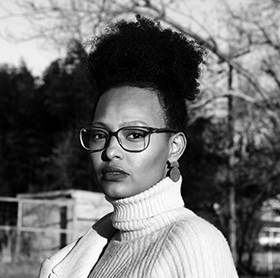On the Last Day, the Bullet is Asked
How was I supposed to know
Medgar? I only met the man once
and even then, freshly fallen,
back flesh a sea split red
with god’s permission. I do
as I am asked and no more—
back, chest, window, wall, sinew,
bone glass, brick—as quick as it
began. For you so loved the son
of man, you begat the sweat-swaddled
plunk of viscera on concrete. And man
so loved the silence he begat the close
hold of a barrel, the blank stare cutting
clean to the other side: a family and greens
on the table two low beds where
stuffed animals still hold the child-
smell of milk, baby powder, Ovaltine.
Outside, the Magnolias, whispering.
Inside, the silence locking in place.
Copyright © 2021 by Sadia Hassan. Originally published in Poem-a-Day on January 21, 2021, by the Academy of American Poets.
“Last summer, I came across a series of photographs of Medgar Evers’ home and the photographs raised questions for me about what it meant to live in service to a vision. I began to think about what objects of terror conscripted in service to white supremacy might have to say on a day where every animate and inanimate object of creation is moved to account for itself. The bullet’s predicament reminded me of a line in Ladan Osman’s poem ‘Ordinary Heaven’: ‘I am sorry for you, I tell her / you witness but don’t testify.’ Even while the bullet’s testimony is arrogant, refusing to move beyond: I was asked to do a thing and so I did it, I wanted to honor that impulse, to sit with the possibility of it in my own life. If an object of terror can bear witness to its own complicity and give incomplete testimony after the fact, how much more possible is it for me, with agency and vision, to misname where I am complicit and with whom.”
—Sadia Hassan

